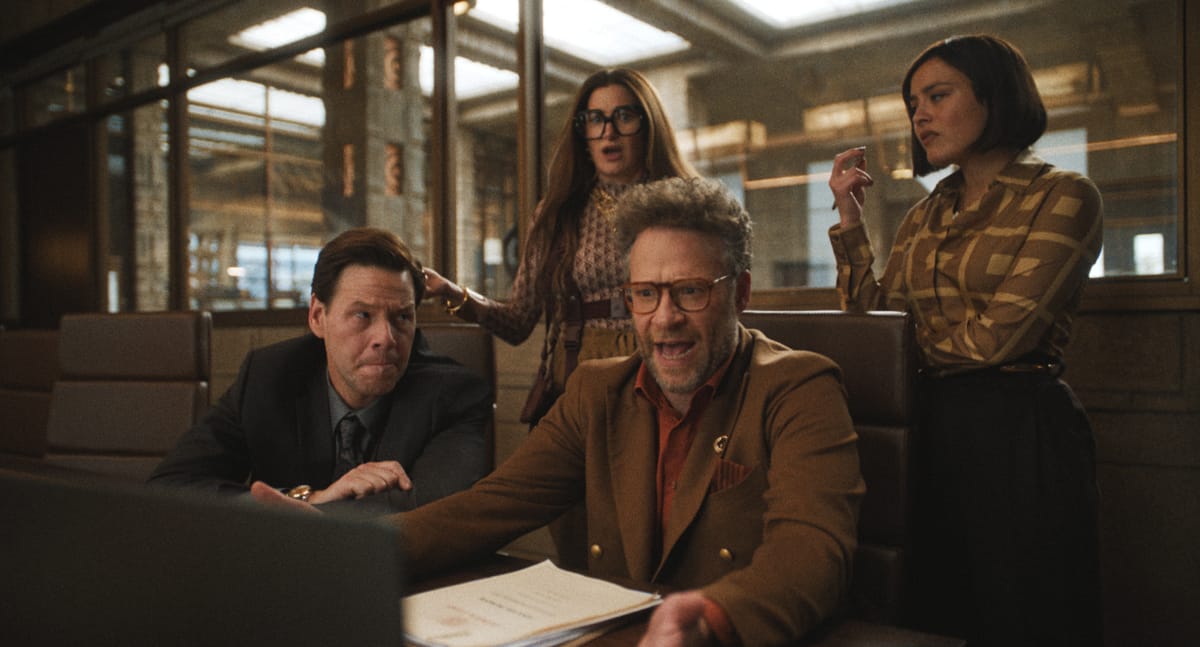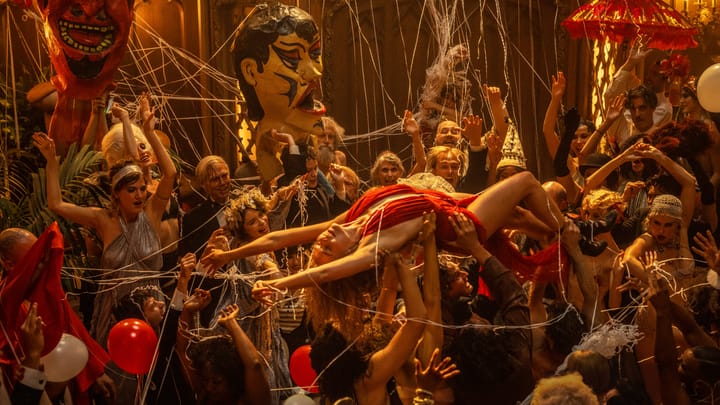The Studio Loves The Movies
The Studio is an absurdist satirical adventure about the battle between art and commerce, one that leads to all kinds of hijinks but ultimately showcases an endearing love of making movies — for all its good and bad.

“I got into all of this because I love movies. Now I have this fear that my job is to ruin them.”
This is the prevailing conflict of The Studio, a delightful Hollywood satire with heart.
Seth Rogen plays a recently promoted film studio head who learns the hard way that the job isn’t all it’s cracked up to be. With his close team of misfits, he must navigate the unglamorous side of running a film studio— a minefield of ego, social politics, peer pressure, and the constant demand to deliver huge profits for the corporate parent — all while trying to leave his mark on film history.
It’s an absurdist satirical adventure about the battle between art and commerce, one that leads to all kinds of hijinks but ultimately showcases an endearing love of making movies — for all its good and bad.
While the absurdity can be hit or miss at times, that’s part of the point. The business has a ridiculous culture that’s a drama unto itself where creative expression collides with commerce, leading to endless competing and conflicting interests.
Rogen and writing partner Evan Goldberg clearly bring their passion (the movies) and personal experience (the business) to the show. They use that combination not only to influence the story but also how they tell those stories.
The show takes the uncommon perspective of offering grace to those in charge — studio executives — and infuses each episode with a unique stylistic choice, the long take. Their extensive use of continuous shots builds palpable pressure in every episode while also heightening the comedy. It’s refreshing, both narratively and visually. But the experimentation doesn’t end there.
What makes the show sing are its send-up episodes of specific film genres and techniques. The two standout examples are the “oner” and the film noir episodes.
But before diving into those, a note on metatextuality. I’m typically not a fan of meta jokes — the kind where the audience, the characters, and the creators are all in on the same joke. It can feel cheap or lazy, as if the show is nudging the viewer to say, “oh I see what they are doing here, doing the thing they are referring to; clever’.” As a comedian friend once told me, clever doesn’t mean funny. That’s how meta humor usually lands for me.
The Studio feels different in this context. The self-awareness is baked into the premise — a TV show about show business — but the creators neither lean too hard into it nor run away from it. They generally ignore the meta layer, but aren’t afraid to use it when it serves the story.
Case in point, the “oner” episode. A technical and artistic spectacle — difficult to execute and, more importantly, needing proper motivation. Like meta jokes, it can be a gimmick, but when used with purpose and tied to the story, it becomes something special. Here, they lean into the conceit, establish the show’s visual language, and hang a lantern on the idea — all while deepening the understanding of the film production world for the uninitiated.
This came in the second episode — an aha moment that established the show’s energy and style. You might not notice it right away in the pilot, but the long take becomes the show’s visual language, and that became clear after this episode.
Conversely, the film noir episode was my favorite because it’s an homage not to a storytelling device but to an entire genre and style. It’s the classic form of the medium — one that cinephiles obsess over — so of course they devoted an entire episode to it.
Rogen and Goldberg’s affection for movie history shines through in this installment. And because it’s a comedy, the creative team has the freedom to play, parody, and celebrate at once. They’re not reinventing the form; they’re joyfully embracing it. It’s everything a movie lover dreams of — to play inside a favorite genre without the pressure to make it new.
I hope there are more episodes like this in future seasons. When the show leans into a genre and uses its conventions as a framework, it’s fun and comforting — low stakes, high humor, and full of heart. Ted Lasso comes to mind.
The Studio is by no means perfect — it can be uneven at times— but you can feel its affection for the subject of producing movies, even as it shines a humorous light on the business side that’s often portrayed as cutthroat.
Because at the end of the day, there are all kinds of people who love movies — even the ones running the studio.





Comments ()